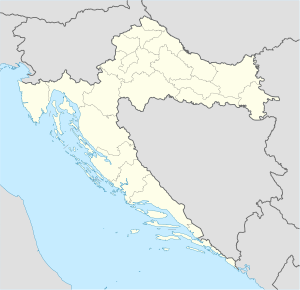UNPA Western Slavonia/Sector West (shaded green) on a map of Croatia. Other UNPAs/sectors are shaded red, blue and purple. | |
| Signed | 18 February 1993 |
|---|---|
| Location | Daruvar, Croatia |
| Mediators | Gerard Fischer |
| Signatories | Veljko Džakula, Dušan Ećimović, Milan Vlaisavljević, Mladen Kulić, Đorđe Lovrić and Milan Radaković for the RSK; Zlatko Kos, Zdravko Sokić, Ivan Volf, Vladimir Delač and Želimir Malnar for Croatia |
| Parties | |
The Daruvar Agreement (Serbo-Croatian: Daruvarski sporazum) was a document negotiated by Croatian and Republic of Serbian Krajina (RSK) local authorities in the United Nations Protected Area (UNPA) for the SAO Western Slavonia, also known as Sector West on 18 February 1993, during the Croatian War of Independence. The agreement provided for the improvement of water and electrical power supply, the return of refugees to their homes and the opening of transport routes spanning Sector West and connecting Croatian Army-controlled areas near towns of Nova Gradiška and Novska. It also provided a framework for the further improvement of living conditions of the population both in the Croatian- and RSK-controlled portions of Sector West. The agreement was named after Daruvar, the site of its signing.
The Daruvar Agreement, mediated by the head of the United Nations (UN) Civil Affairs in Sector West Gerard Fischer, was negotiated in secrecy. When the central RSK authorities in Knin learned of the arrangement, the signatories on behalf of the RSK were sacked from their official posts and arrested. The agreement itself was labeled as treasonous by the central RSK authorities. Fischer and other UN officials, who were involved in mediation of the agreement, were criticised by the UN for being excessively assertive in the matter. Fischer soon left the area.

